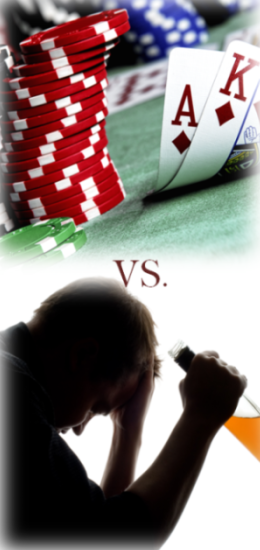Don’t Gamble Your Life Away
 You’ve walked around the casino for the last three hours feeding slot machines, playing roulette, feeling the thrill of winning and the agony of losing. But right now you feel lucky, a sort of feeling you couldn’t explain to someone, but makes perfect sense to you. A feeling where when going up against 1 and 3 odds doesn’t seem like a risk, and something inside you says put it all on the line. Imagine if you won all that money! So you hold your breath and go for it…
You’ve walked around the casino for the last three hours feeding slot machines, playing roulette, feeling the thrill of winning and the agony of losing. But right now you feel lucky, a sort of feeling you couldn’t explain to someone, but makes perfect sense to you. A feeling where when going up against 1 and 3 odds doesn’t seem like a risk, and something inside you says put it all on the line. Imagine if you won all that money! So you hold your breath and go for it…
The card is dealt, the dice rolled, the handled pulled… and instead of the 1 in 3 chance of winning big coming through, the 67% chance of losing it all hits you upside the head. And in a massive turn of events you discover yourself drained of all emotion—shocked that half your livelihood just slipped through your fingers, terrified that its gone for good, but determined to get the money back—determined to win that money back. And you play again… and again… and again.
 Gambling Addiction
Gambling Addiction
As you can observe from the scenario presented above, gambling is a slippery slope, a downward spiral that rapidly results in gambling compulsively, or worse—a gambling addiction. Like any other addiction, gambling is a process preceded by emotions, thoughts and fantasies—one thought leads to another, which leads to an emotional response, which leads to more emotional responses, which can lead to an obsession.
Common characteristics of someone with a gambling problem would include:
- Denying that you have a gambling issue.
- Not having control over your gambling.
- People are worried about you.
- Taking money meant for other things, and using it to gamble.
Identifying the Gambling Problem
Sometimes referred to as the “hidden illness,” gambling addiction rarely presents itself in an obvious form. Addicts often make a point to suppress, deny, or minimize their problem; often hiding it from loved ones and family members. The fear of embarrassment and pride inhibit honesty, and as a result, many addicts continue to suffer and do nothing about it.[ref]http://www.way2hope.org/gambling_addiction_problems.htm[/ref]
Like many other addictions, no one becomes a pathological (or uncontrolled) gambler overnight. Emotional states including loneliness, depression, anxiety, stress, or fear can all invoke compulsive gambling. Many of these emotions escalate into mental disorders when sustained into the addiction, and because addictions intensify emotion, your plan for a  reprieve backfires.
reprieve backfires.
Gambling Addiction vs. Substance Abuse
The distinguishing factor between gambling addiction and drug or alcohol addiction is demonstrated by the very nature of the habit. Unlike the physical effects of a drug or alcohol addiction, gambling is entirely mental. Addicts are said to have impulse-control disorders: a disorder in which addicts are unable to control their impulse to gamble, even when they know the consequences.
Depressed, happy, elated, or broke, gamblers will always find a way to gamble. As irrational as their actions may seem, and no matter how many times they win or lose, they’re willing to override their common sense and play again—that’s what makes gambling so scary.
But I don’t want to make gambling out to be a lifestyle. A common misconception of compulsive gamblers is that they gamble constantly. Problem gamblers may gamble every day or the may gamble infrequently—gambling is only a problem when it causes problems.[ref]http://www.helpguide.org/mental/gambling_addiction.htm[/ref]
Gambling: Causes and Effects
Common gambling instigators include a simple argument, a tough day at work, a problem at home, or even just an attractive way to wind down after a long week. But don’t let the smiling faces on the billboards fool you; your friends never tell you how much money they lost, you only hear the “incredible” stories of winning it big.
Don’t test the gambling waters hoping to find the perfect reprieve. Becoming an addict takes time, foolish sacrifice and sadly, lots of money. The average gambling addict seeking treatment is already tens of thousands of rupees in debt, and rehab isn’t free. [ref]http://www.way2hope.org/gambling_addiction_problems.htm[/ref]
Gambling De-Addiction and Recovery
From lottery tickets, to online gambling, to the casino—the temptation to gamble is always there, and determining to quit without any help is rarely enough. Thankfully, De-Addiction centres across India understand and know how the treat mental addictions. Hundreds of centres
are waiting for addicts, like gambling addicts, to walk through their front door and turn their life around.
International Gambling De-Addiction
Centres around India are flooded with people seeking treatment from various addictions, and gambling is one of them. However, few Indian centres provide specialized gambling deaddiction services. Our featured international centre, Castle Craig Hospital in Scotland has a specialized gambling programme for gambling addicts. If you would like more information about Castle Craig, view their listing page.

Gambler’s Serenity Prayer:
“God Grant me the serenity to accept the things I cannot change, the courage to change the things I can, and the wisdom to know the difference.” –Gambler’s Anonymous












